- Home
- Mark R. Levin
Ameritopia Page 3
Ameritopia Read online
Page 3
There is also no morality in utopian deception and distortion to promote an abstraction, forcing the individual to behave in ways that are contrary to his best interests and destructive of his nature; attacking the civil society’s ethical norms and social arrangements; and making commonplace dependency and coercion. Rather than cultivating a moral society and individual virtuousness, whether through faith, education, or sociability, and building on the accumulated experience and wisdom of earlier generations, utopianism breeds dishonesty not good character; it encourages ideology not reason; it rewards rashness not reflection; it attracts fanatics not statesmen; and it is transformative not reformative. As the world around him grows increasingly unpredictable and hostile, and the moral order of the civil society frays and then unravels, the individual may feel that his daily survival depends on abandoning his own moral nature and teaching, including prudence, self-restraint, and forethought. He may become radicalized and join the ranks of predators, or become isolated and conniving, hoping to avoid notice. He may become dispirited and detached, resigned to a life of misery. He may defiantly stand his moral ground, in which case he may become the predators’ prey. In any event, the law of the jungle becomes the law of the land as the civil society disintegrates.
Clearly, utopianism is incompatible with constitutionalism. Utopianism requires power to be concentrated in a central authority with maximum latitude to transform and control. Oppositely, a constitution establishes parameters that define the form and the limits of government. For example, in the United States, the Constitution divides, disperses, and delineates governmental power. It grants the central government not plenary but enumerated powers. It further deconcentrates power through three branches of the central government, reserving the rest of governmental powers to the states and the people. The Constitution enshrines a governing framework intended to ensure the longevity of the existing society and stifle the potential for tyranny.
The Constitution reflects the Founders’ repudiation of utopianism and any notion of omnipotent and omniscient masterminds. In Federalist 51, James Madison wrote, “But what is government itself but the greatest of all reflections on human nature? If men were angels, no government would be necessary. If angels were to govern men, neither external nor internal controls on government would be necessary. In framing a government which is to be administered by men over men, the great difficulty lies in this: you must first enable the government to control the governed; and in the next place oblige it to control itself.”22 Madison argued that the draft constitution had achieved that end. In Federalist 45, he explained, “The powers delegated by the proposed Constitution to the federal government are few and defined. Those which are to remain in the State governments are numerous and indefinite. The former will be exercised principally on external objects, as war, peace, negotiation, and foreign commerce; with which last the power of taxation will, for the most part, be connected. The powers reserved to the several States will extend to all the objects which, in the ordinary course of affairs, concern the lives, liberties, and properties of the people, and the internal order, improvement, and prosperity of the State.”23
For the mastermind, where the Constitution is believed useful to utopian ends, it will be invoked. Where it is not, under the pretense of legitimate differences of interpretation it will be abandoned outright or remade through various doctrinal schemes and administrative evasions. For the mastermind, the Constitution’s words are as undeserving of respect as the rest of history. They will be used to muddle and disarrange, not inform and clarify. Moreover, the Constitution’s authors, ratifiers, and present-day proponents will be dismissed as throwbacks. To follow them will be to renounce modernity and progress. And yet to follow the mastermind is to renounce the American founding and heritage.
The late associate Supreme Court justice Thurgood Marshall demonstrated the point in his repudiation of the Framers. “I do not believe that the meaning of the Constitution was forever ‘fixed’ at the Philadelphia Convention.… Nor do I find the wisdom, foresight and sense of justice exhibited by the framers particularly profound. To the contrary, the government they devised was defective from the start, requiring several amendments, a civil war and momentous social transformation to attain the system of constitutional government, and its respect for the individual freedoms and human rights, we hold as fundamental today. They could not have imagined, nor would they have accepted, that the document they were drafting would one day be construed by a Supreme Court to which had been appointed a woman and the descendant of an African slave. ‘We the people’ no longer enslave, but the credit does not belong to the framers. It belongs to those who refused to acquiesce in outdated notions of ‘liberty,’ ‘justice’ and ‘equality,’ and who strived to better them.”24
There is no denying that slavery blights the history of many societies, including American society. But the Constitution neither preserved nor promoted slavery. As I explained in my response to Marshall in Men in Black, “Discrimination, injustice, and inhumanity are not products of the Constitution. To the extent they exist, they result from man’s imperfection. Consequently, slavery exists today not in the United States but in places like Sudan. Indeed, the evolution of American society has only been possible because of the covenant the framers adopted, and the values, ideals, and rules set forth in that document.”25 In fact, had there been no Constitution there would have been no United States. If there had been no United States there would have been no Civil War—no Union versus Confederacy. Slavery in the southern colonies and later the territories may well have lasted much longer. While the delegates to the Constitutional Convention were unable to abolish slavery, many tried. Moreover, their progeny did, and at great personal sacrifice.
The Constitution evinces the Founders’ broader comprehension of human nature and natural rights, set forth most succinctly and prominently in the Declaration of Independence. To cast the Constitution off its mooring is to cast off its mooring as well. The Declaration provides, in part:
When in the Course of human events, it becomes necessary for one people to dissolve the political bands which have connected them with another, and to assume among the powers of the earth, the separate and equal station to which the Laws of Nature and of Nature’s God entitle them, a decent respect to the opinions of mankind requires that they should declare the causes which impel them to the separation. We hold these truths to be self-evident, that all men are created equal, that they are endowed by their Creator with certain unalienable Rights, that among these are Life, Liberty and the pursuit of Happiness.—That to secure these rights, Governments are instituted among Men, deriving their just powers from the consent of the governed.…
President Abraham Lincoln, during his 1858 campaign for the U.S. Senate, explained: “In [the Founders’] enlightened belief, nothing stamped with the Divine image and likeness was sent into the world to be trodden on, and degraded, and imbruted by its fellows. They grasped not only the whole race of man then living, but they reached forward and seized upon the farthest posterity. They erected a beacon to guide their children and their children’s children, and the countless myriads who should inhabit the earth in other ages. Wise statesmen as they were, they knew the tendency of prosperity to breed tyrants, and so they established these great self-evident truths, that when in the distant future some man, some faction, some interest, should set up the doctrine that none but rich men, or none but white men, were entitled to life, liberty and the pursuit of happiness, their posterity might look up again to the Declaration of Independence and take courage to renew the battle which their fathers began—so that truth, and justice, and mercy, and all the humane and Christian virtues might not be extinguished from the land; so that no man would hereafter dare to limit and circumscribe the great principles on which the temple of liberty was being built.…”26
America’s founding documents set in place the philosophical and political foundation for a just and humane society—unlike any before it or since.
Fidelity to these principles abolished slavery, just as they can ensure the civil society’s longevity. The mastermind and his followers mostly ignore the Declaration and pick the Constitution like an old scab. As I wrote in Liberty and Tyranny, “The Modern Liberal believes in the supremacy of the state, thereby rejecting the principles of the Declaration and the order of the civil society, in whole or part. For the Modern Liberal, the individual’s imperfection and personal pursuits impede the objective of a utopian state. In this, Modern Liberalism promotes what … Tocqueville described as a soft tyranny, which becomes increasingly more oppressive, potentially leading to a hard tyranny (some form of totalitarianism). As the word ‘liberal’ is, in its classical meaning, the opposite of authoritarian, it is more accurate … to characterize the Modern Liberal as a Statist.”27
Utopianism is not new. It has been repackaged countless times—since Plato and before. It is as old as tyranny itself. In democracies, its practitioners legislate without end. In America, law is piled upon law in contravention and contradiction of the governing law—the Constitution. But there are no actual masterminds who, upon election or appointment, are magically imbued with godlike qualities. There are pretenders with power, lots of power. When they are not rebelling they are dictating, but the ultimate objective is always the same—control over the individual in order to control society. They are adamantly committed to their abstraction and their accumulation of authority to pursue it, to devastating effect. Accordingly, its exploration in this book—from Plato’s Republic to what I term modern-day Ameritopia—is essential to understanding the nature and influence of this force on American society today.
CHAPTER TWO
PLATO’S REPUBLIC AND THE PERFECT SOCIETY
PLATO WAS NOT THE first but he was among the most prominent of the earliest philosophers to develop a utopian state model. Plato’s Republic1 was written in approximately 380 BCE. Applying his notions of a just society, Plato claimed to construct an “ideal city” through a fictional dialogue between Socrates and others. In fact, what he created is a totalitarian state. Although there has been much discussion among scholars throughout the centuries about Plato’s intent in writing the Republic, his most prominent critic was none other than his onetime student, Aristotle. Nonetheless, the Republic’s influence on subsequent philosophers and societies is clear. It is not difficult to find the germs of Marxism, National Socialism, Islamicism, and other forms of utopianism in the Republic. Indeed, while all particulars clearly are not relevant, the Republic’s grand attempt to create the perfect society resonates throughout Western democracies, despite its rejection of democracy.
Plato’s first proposal for the Republic’s Ideal City is described as a “true and healthy” model for utopian life. This city provides for only the most basic needs of its citizens—food, shelter, clothing, and shoes. It is constructed on a simple division of labor where each individual does a single job based on his most productive skills. Each individual accepts his position in the City and does what he is supposed to do for the benefit of himself and the other citizens. He does this because all of his needs are met.
There is no competition among the citizens, and since the City is perfectly just, there is no need for a government. The Ideal City does not have any luxuries—including furniture, entertainment, and meat (369–372c).
Plato acknowledges that this most basic city is not one with which many will be satisfied, because of its overly simple way of life (373a). Therefore, he constructs another Ideal City, which he describes as “feverish” and “luxurious,” but which accommodates human desire (372e). In truth, what it promotes is, for most, the individual’s subservience to the state—state control of private property, health care, the workforce, housing, and more. It establishes a strict class system and uses eugenics, euthanasia, arranged marriages, and the ongoing indoctrination of the masses to maintain unity in the “just society.” And it is built on a foundation of falsehoods, propaganda, and censorship. The intention is to create an aristocratic ruling class of philosophers—Guardians—who will rule wisely and guide the City.2 Of course, there is little to prevent the ruling class from abusing its power and ruling on its own behalf, as history has demonstrated time and again.
The “feverish” City will allow certain luxuries, like “sofas and tables and other furniture; also dainties and perfumes and incense and courtesans, and cakes … and gold and ivory and all sorts of materials [that] must be procured” (373a). The Guardians determine who gets what.
The Ideal City will then need to enlarge its borders as it will “fill and swell with a multitude of callings which are not required by any natural want.…” (373b) Pasture and tillage land will also be needed, which Plato argues will have to come from neighboring cities, which will also threaten expansion (373d). This will require the City to develop the capacity to make war (373d). A warrior class of Auxiliaries must, therefore, be cultivated (373e–374a). They will be trained to be aggressive and ruthless, but must also be controlled so as to keep them gentle toward the citizens of the City (375e). The Auxiliaries serve the Guardians, the latter being the only class trained in reason. The Guardians are to be a pure race of leaders, originally bred from the best citizens (415a).
Plato takes his class structure very far. He invents the “noble lie”—a contrivance taught from the earliest age that each person is born of the earth rather than from a mother. Moreover, each individual is said to be born with a particular metal—gold, silver, or bronze—intermingled in his or her body. The metal determines the person’s status and relative worth in the City—the gold-souled citizens are the Guardians, the silver-souled citizens are the Auxiliaries, and the bronze-souled citizens are the Producers (although they are treated more like slaves) (415a).
The City’s unity and stability, essential in the Republic, require that its citizens be conditioned to accept their positions and surrender their personal desires to the needs of the City. The individual’s happiness is secondary to the general welfare of the City. Individuals are conditioned to suppress their personal desires in favor of acting for the common good. “The noble lie,” therefore, is supposedly necessary because it promotes universal acceptance of the individual’s class status. Citizens will feel more kinship with the City, eliminate political factionalism and civil strife, and promote patriotism (415d).
The City is structured to exercise absolute control, a top priority being to ensure purity within the classes. The Guardians have among their most important duties the strict regulation of the birth of children and, hence, the sexual activity of adults (415b). Only gold men may mate with gold women, and so on with the other classes. Sexual partners are chosen based on a phony lottery system, the outcome of which is arranged in advance by the Guardians. If somehow a bronze child manages to be born to a gold parent, the child is removed and sent to live among the bronze people (415c).
In the Republic, Plato also promotes eugenics—that is, the creation of a pure race. A “first principle” for rulers is “above all else, that there is nothing which [the rulers] should so anxiously guard, or of which they are to be such good guardians, as the purity of the race” (415b). The purity of the race is maintained through state-managed sexual activity—“the best of either sex should be united with the best as often, and the inferior with the inferior as seldom as possible.… Now these goings on must be kept secret which the rulers only know.… We shall have to invent some ingenious kind of lots which the less worthy may draw on each occasion of our bringing them together, and then they will accuse their own ill luck and not the rulers” (459d–460a).
Obviously, the nuclear family is abolished. Men, women, and children live communally (423a). Children are removed from their mothers soon after birth and raised and educated collectively. The City replaces parents and their contemporaries become their brothers and sisters (414d). The purpose is to create a single extended family—the City itself. In this way, the individual will presumably become loyal to and reliant on the City,
thereby eliminating competitiveness between the City and family.
Plato argues that private property has the potential of corrupting the Guardians, who are to act solely in the City’s best interests. Therefore, they are to own no property. Plato writes: “Then now let us consider what will be their way of life, if they are to realize our idea of them. In the first place, none of them should have any property of his beyond what is absolutely necessary; neither should they have a private house or store closed against anyone who has a mind to enter; their provisions should be only such as are required by trained warriors, who are men of temperance and courage; they should agree to receive from the citizens a fixed rate of pay, enough to meet the expenses of the year and no more; and they will go to mess and live together like soldiers in camp.…” (416d–e)
The purpose of “both the community of property and the community of families … tend[s] to make them more truly Guardians; they will not tear the City in pieces by differing about ‘mine’ and ‘not mine’; each man dragging any acquisition which he has made into a separate house of his own, where he has a separate wife and children and private pains and pleasures; but all will be affected as far as may be by the same wife and children and private pleasures and pains because they are all of one opinion about what is near and dear to them, and therefore they all tend toward a common end.… And as they have nothing but their persons which they can call their own, suits and complaint will have no existence among them; they will be delivered from all those quarrels of which money or children or relations are the occasion” (464d–e).

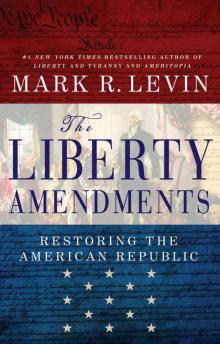 The Liberty Amendments: Restoring the American Republic
The Liberty Amendments: Restoring the American Republic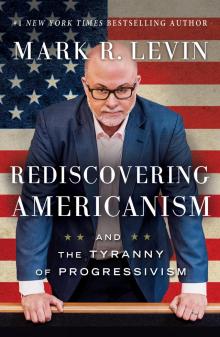 Rediscovering Americanism: And the Tyranny of Progressivism
Rediscovering Americanism: And the Tyranny of Progressivism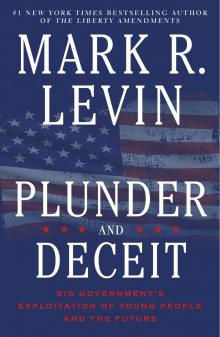 Plunder and Deceit: Big Government's Exploitation of Young People and the Future
Plunder and Deceit: Big Government's Exploitation of Young People and the Future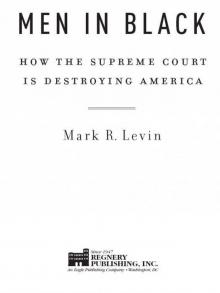 Men in Black: How Judges Are Destroying America
Men in Black: How Judges Are Destroying America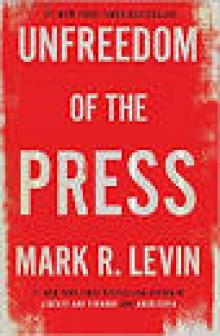 Unfreedom of the Press
Unfreedom of the Press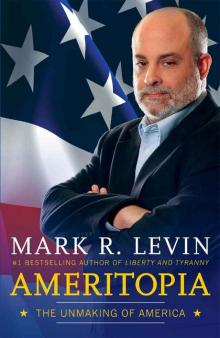 Ameritopia: The Unmaking of America
Ameritopia: The Unmaking of America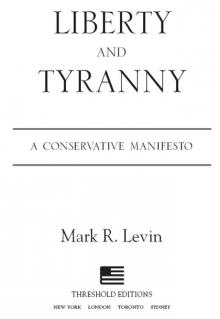 Liberty and Tyranny
Liberty and Tyranny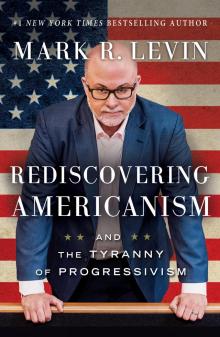 Rediscovering Americanism
Rediscovering Americanism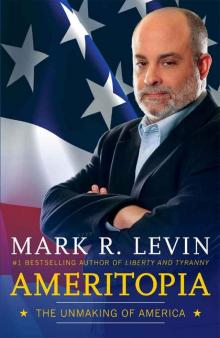 Ameritopia
Ameritopia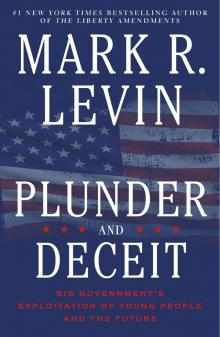 Plunder and Deceit
Plunder and Deceit